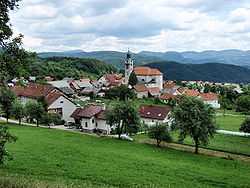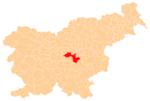Vače
| Vače | |
|---|---|
 | |
_location_map.svg.png) Vače | |
| Coordinates: 46°7′10.39″N 14°50′16.82″E / 46.1195528°N 14.8380056°ECoordinates: 46°7′10.39″N 14°50′16.82″E / 46.1195528°N 14.8380056°E | |
| Country |
|
| Traditional region | Lower Styria |
| Statistical region | Central Slovenia |
| Municipality | Litija |
| Area | |
| • Total | 1.75 km2 (0.68 sq mi) |
| Elevation | 521.3 m (1,710.3 ft) |
| Population (2002) | |
| • Total | 312 |
| [1] | |
Vače (pronounced [ˈvaːtʃɛ]; German: Waatsch[2]) is a settlement in the Municipality of Litija in central Slovenia. Traditionally the area was part of Lower Styria and is now included with the rest of the municipality in the Central Slovenia Statistical Region.[3]
Archeological finds
The settlement is best known for the Hallstatt-period Vače situla (Slovene: situla z Vač, vaška situla), an archaeological treasure of Slovenia, which was discovered in neighboring Klenik in 1882. It is a bronze vessel with a triple figurative frieze. Another important find was the Vače belt-plate (pasna spona z Vač), also discovered in Klenik.
Church
The local parish church is dedicated to Saint Andrew and belongs to the Roman Catholic Archdiocese of Ljubljana. It was built in 1844 on the site of an earlier building that was destroyed by fire.[4]
Notable people from Vače
- Matija Hvale (1470–1518), Slovene philosopher
Gallery
-
Pillory
-
Traditional building
References
- ↑ Statistical Office of the Republic of Slovenia
- ↑ Leksikon občin kraljestev in dežel zastopanih v državnem zboru, vol. 6: Kranjsko. 1906. Vienna: C. Kr. Dvorna in Državna Tiskarna, p. 96.
- ↑ Litija municipal site
- ↑ Slovenian Ministry of Culture register of national heritage reference number ešd 2623
External links
 Media related to Vače at Wikimedia Commons
Media related to Vače at Wikimedia Commons- Vače on Geopedia


